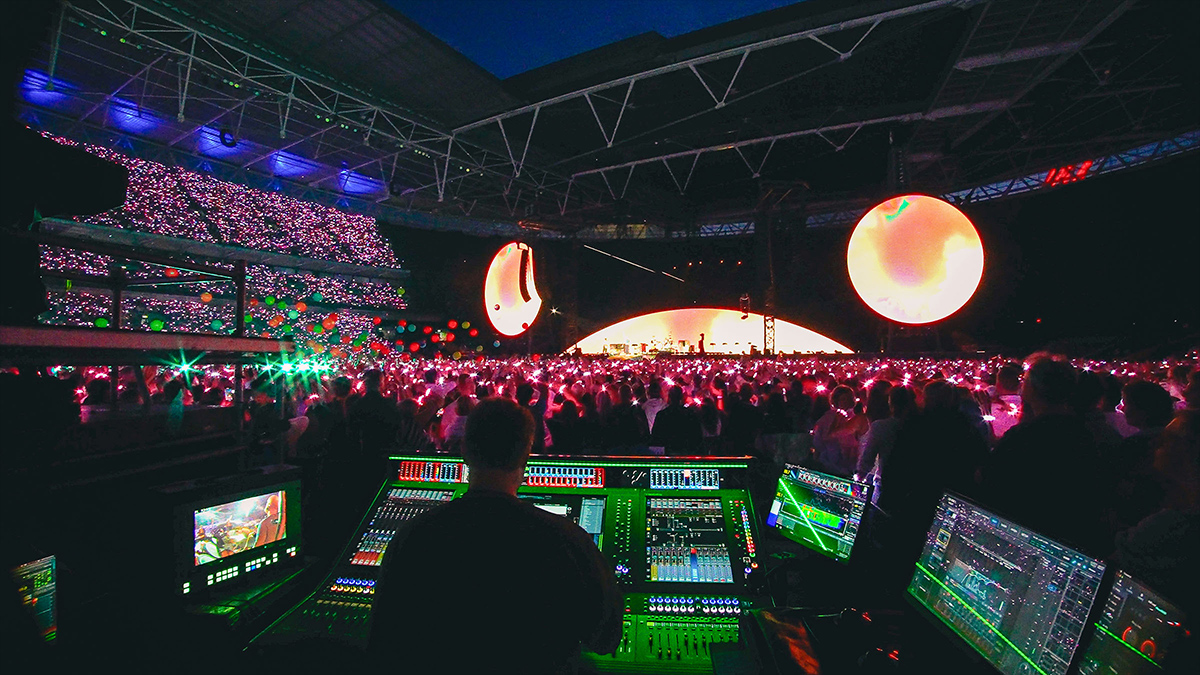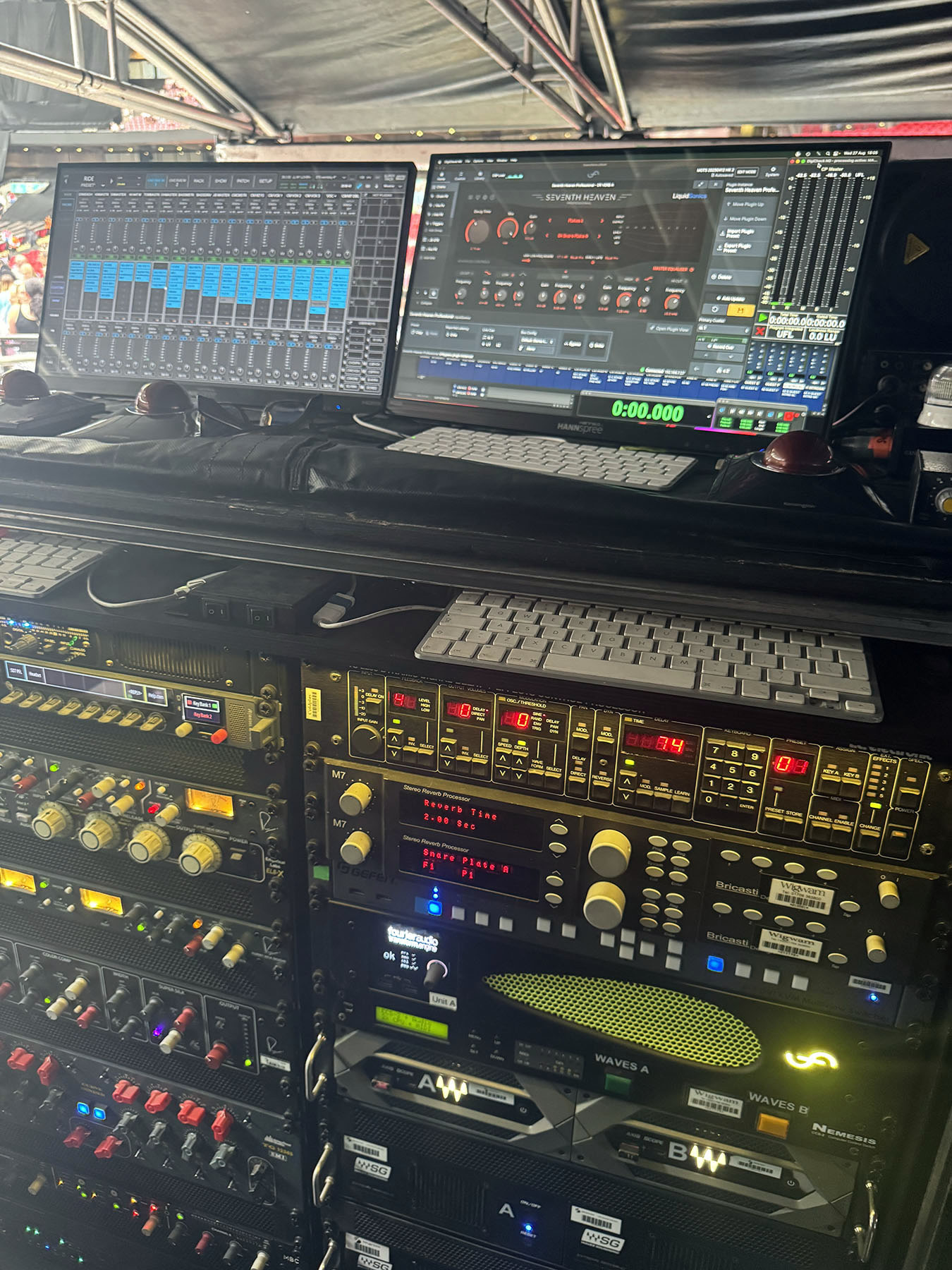“We've just upped it to 256 channels, which sounds crazy”: Coldplay’s live engineers reveal the lengths they go to to record every single show on the band’s never-ending Music of the Spheres tour
There are still at least 138 dates to go

Want all the hottest music and gear news, reviews, deals, features and more, direct to your inbox? Sign up here.
You are now subscribed
Your newsletter sign-up was successful
Believe it or not, Coldplay’s Music of the Spheres tour has been on the road (albeit with a few breaks) since 2022, but for Dan Green, who has been the band’s FOH engineer and audio producer since 1998, work on it began even further back.
In a new video from DiGiCo Consoles, which takes us behind the scenes on the band’s globetrotting adventure, he says he started preparing “round about five years ago,” right after the Music of the Spheres album had been completed (this ended up being released in 2021, and was followed by another album, Moon Music, in 2024).
“We were prepping for about six months, and then we started in Costa Rica in March of 2022,” confirms Green, an indication of how much work he had to put in before the band ever set foot on stage. Or should we say ‘stages’, because, as anyone who’s seen the Music of the Spheres tour will know, Chris Martin and co actually perform in three distinct areas during the set.
“We've got a full band setup on the A stage and then we've got almost a full band setup on the B stage and then the C stage is more of like an acoustic section,” says Green.
Wherever they are in the world and whatever stage they’re on, it turns out that Coldplay are being recorded, and not just by fans on their phones, but on two Pro Tools systems.
“Whenever the bands are on stage, we’re recording,” says head of audio system design and FOH tech, Tony Smith. “We've just upped it to 256 channels, which sounds crazy, but with the A stage, B stage, C stage… also we record ambient mics, so we’ve got 32 channels of ambient mics.”
Green then uses his DiGiCo system to create more manageable submixes of around 48 channels that can be sent to broadcasters as stems. Smith says that he records these on a separate Pro Tools system so that they can be used at speed on Coldplay’s social media channels if ‘content’ is required.
Want all the hottest music and gear news, reviews, deals, features and more, direct to your inbox? Sign up here.
Green also discusses his use of Fourier Audio’s transform.engine - he and Smith first got their hands on two and a half years ago when it was in beta - noting the extra flexibility that it gives him.
“Fourier was really interesting to me as I was able to host the VST3 plugins that I use a lot in the studio, and I wanted to have the opportunity to bring these into a live context,” he says. “I was really excited to beta test it. And as soon as we got the full working version – the official release – we put it into our system, and it’s been fantastic. I’ve uploaded all of my effects onto the Fourier and have really enjoyed exploring VST3 plugins in a way that I wasn’t able to do before.”

“With mixing live audio, I’ve always enjoyed using plugins because it enables me to switch things out and try different things on an almost nightly basis, if I want,” he continues. “Hardware is amazing and I love it, but it’s quite restricting in the fact that once you’ve built a rack, you’re normally stuck with that rack for the duration of the tour or the whole campaign – in our case, that’s four years! So it’s quite hard to change things in and out on an ad hoc basis when it’s all still working. With the transform.engine, having access to all of these VST3 plugins enables me to experiment with any idea that I may have. Anything that pops to mind, I can basically just give it a try.”
That all sounds like a huge amount of responsibility, but Green says that there’s plenty of job satisfaction, too. “We're really proud of what we've achieved with the sonics and the sound of the Coldplay shows. And yeah, we always get nice comments back about the shows, you know, around the venue and wherever you are in the venue. It's a great experience. And also, it's great because the social feeds are sounding brilliant because of our stem system; broadcasts are always sounding great.”
To illustrate this last point, Green says that he and Smith had positive feedback from the BBC about their work on Coldplay’s 2024 Glastonbury set. “We’re really happy with how everything’s sounding,” he adds.
But the work isn’t over yet: the tour may currently be on hiatus, but Coldplay have confirmed that they intend to perform a further 138 shows in 2027. Wowzers.

I’m the Deputy Editor of MusicRadar, having worked on the site since its launch in 2007. I previously spent eight years working on our sister magazine, Computer Music. I’ve been playing the piano, gigging in bands and failing to finish tracks at home for more than 30 years, 24 of which I’ve also spent writing about music and the ever-changing technology used to make it.
You must confirm your public display name before commenting
Please logout and then login again, you will then be prompted to enter your display name.

